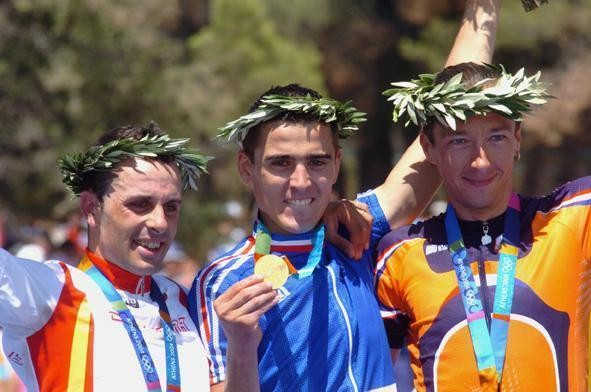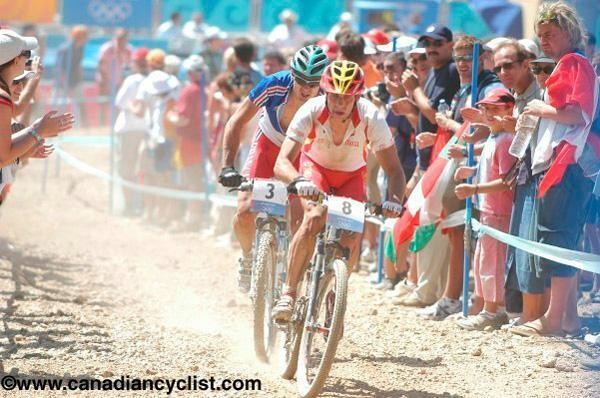The Spanish Cowboy
Age: 26 Born: August 24, 1978 Place of birth: Puigcerdà (Girona) Marital status: single Nickname:...


An interview with Jose Antonio Hermida, December 1, 2004
He is Catalan. He is a cyclist who loves sport. And he is one of the best mountain bike riders in the world. As well as all that, Jose Antonio Hermida took silver in the cross country in Athens last August. At that moment, he made an unusual gesture: he put his hands in the air as if they were guns, and started 'shooting' to celebrate his podium place.
The 26 year-old goes further against the grain by taking a blender with him on every trip, he likes winter and enjoys cross country skiing. These are not common habits for a top-level rider. While he was in his home town in Pugicerdà (Catalonia), Cyclingnews' Hernan Alvarez Macias learned a little more about this irreverent Spanish cowboy.
Cyclingnews: The joy of winning the silver medal in Athens stills remains in you, right?
Jose Antonio Hermida: Yes, it is a memory and a triumph, between parentheses, for life. Little by little, I am realizing what I have done, but the future doesn't stay seated in a chair. I have almost started next season by starting to train. Now I have other goals for the coming years.
CN: That medal was your greatest joy of your sporting career?
JAH: Yes, it is among the greatest joys. It wasn't the only one, I had different joys throughout my sporting career. For example, the World Championships that I won [in 2000], and the Napa Valley race in San Francisco from the World Cup [in 2001] that I won. Every victory has its moment of happiness and is special. The point is that the [Olympic] Games, for their dimensions, for the media attention to the Games, is a race that one enjoys a lot. Let's say it is one of the many joys I had, not the only one.
Get The Leadout Newsletter
The latest race content, interviews, features, reviews and expert buying guides, direct to your inbox!
CN: Why did you do that gesture of using guns to celebrate your second place?
JAH: That was a promise that I made with a training mate, Juan Antonio Flecha, the road rider. We said that when he wins a race, he would do the archer, the Indian throwing an arrow [flecha means arrow in Spanish-Ed]. And I would do the cowboy showing the guns. It was a promise that we made at the Sydney Olympic Games in 2000. It was a good moment to remember what we promised.
CN: It seems that even years are better for you than odd years. Is there a reason for that?
JAH: No, I train and I prepare every year as if it was the last one. There are some people who told me that I perform better on even years than on odd years. Maybe from now on, I will think about fighting harder on odd years. Next year [2005] I will be up there on the front, I will fight for the races and we will see if I can break this kind of tradition over the last years.
CN: You are currently fifth in the UCI cross country world ranking. Is that place important for you or your achievements are more important than the ranking in itself?
JAH: The ranking, especially in mountain bike, is something relative. Because sometimes there are riders who are leading the ranking and they are not winning races or they are not riding in [important] races. Sometimes they are not at the front in the World Cup or the World Championship but they remain in the top three positions. So, the UCI ranking is very relative; if one is focused on the World Championship or the Olympic Games, it is certain that one may not go for every point that is disputed around the world. One has to select the races.
The ranking does not have surprises. In the case of Bart Brentjens, he has been the leader for a long time when he didn't go very fast. In the Games he was third, but in the other races he wasn't among the leaders. And he remained leading the UCI ranking for much time. It is a ranking that doesn't worry me much; what really worries me is the World Cup, the World Championship. Those are "rankings" that show how strong people are.
CN: We know that you always travel with a blender in your luggage. Why is that?
JAH: It is to make shakes. When I finish my training, I used to make shakes with proteins and with different supplements from our sponsors. Instead of mixing them with the hands for a long time, I bring my blender with me and I do that in a minute. I can even add bananas and I crush everything faster. It is a question of comfort.
CN: It is for recovering energy, right?
JAH: To recover from races, and from training. There are different kinds of nutritional supplements that one should make, shaken or combined with water, milk or yoghurt.
CN: Have you already started your off-season?
JAH: Yes, I started last week. I started running a bit, swimming, riding, a bit of everything.
CN: Are you training in your town?
JAH: I'm training near Puigcerdà, in Llivia. It is four kilometres far from Puigcerdà. It is in the province of Gerona, in the Pyrenees, very near Andorra.
CN: When will you start riding hard?
JAH: I don't think about my calendar with my team, but I think I will start racing in March. At the beginning of March, we will probably begin competing in races in Italy and in Germany. And then at the end of April we begin the World Cup. So, this year I should be in even better shape.
CN: You do Nordic skiing. Is that correct?
JAH: Yes, I used to ski in winter. I do cross country skiing and alpine skiing. I used to combine the cross country skiing and the alpine skiing with aerobic activities that allow me not to stay on the bike the whole year. In the winter period when we don't have races, I can rest for a while doing that and improve my shape at the same time.
CN: That would be to strengthen your legs...
JAH: Yes, for a bit of everything. It is useful to strengthen the same muscles one uses on the bicycle. Doing cross country skiing, one does the same kind of work over a bike. It is also useful for relaxing.
CN: Journalists should have asked you this question many times. Would you like to compete on the road? Michael Rasmussen is doing really well. What do you think?
JAH: I received many offers to compete on road. I didn't go, because I think it is not the right moment. I have a tight calendar on mountain bike. And my discipline is actually mountain bike. Maybe in the future, I will do something sporadic, for training. I can even do something professionally but I am happy doing mountain bike. I have a good life doing this, I am relaxed and this is a thing that must be appreciated.
CN: What is the big goal for the 2005 season?
JAH: It will be the World Cup - try to win a race from the World Cup and the World Championship. The Cup races begin in April and the World Championship on September 4. We will ride eight races around the world, including one in Brazil, Canada, Austria, Scotland, Spain, and Belgium. [Belgium will hold two races and Germany is taking the place of a race in Austria; there is also a World Cup race in the USA-Ed.] So, we have a very tight calendar.
CN: Are you going to train with Juan Antonio Flecha or Roberto Heras this year?
JAH: Yes, Flecha lives here and we train every time he is here. He also has commitments with his team in Italy. Every time he is here, we are together and we train together.
Last year, Heras was training over here. If Heras comes here again, we will certainly train together again. The point is that they also have their calendars and sometimes it is difficult for us to join together, to do the same work, the same training. Sometimes when Flecha comes, I am training hard and he has to rest or vice versa.
CN: Is it hard to train over the winter? It seems you don't complain about that.
JAH: It depends, I like winter. I usually don't go to warmer places like Valencia or southern Spain in winter. I stay here because I think winter is to rest, aso one must get the most of winter. It's time to do other things and to relax, to have another mentality during that period. Afterwards, one must go out with the bike logically.
I think riding in winter is part of the training and it gives you strength. When you face a race in the middle of the season with rain and snow, one is more accustomed to that for being training in these conditions. However, winter is time to rest too. Feeling cold is also good.
CN: I have to ask you a difficult question. What happened last September when you were not able to compete in Les Gets, France?
JAH: Well, the answer is very easy. It's simple: the UCI thought I was at a risk because I had a hematocrit higher than 50 percent. And it was treated like a doping case. In the end, I have demonstrated it wasn't doping. Three days ago [November 21], I received a UCI special permission in order not to have these kind of problems anymore. However, this disallowed me to compete in the World Championship, where I had big chances of winning the title.
It was simply that. The UCI thought my health was in jeopardy, because the high hematocrit is always connected with the use of a well-known substance [EPO]. In my case, that level is natural. I think when an international organization accuses somebody, they should have evidence that a rider has doped. It should not accuse just with numbers; in fact, many people have [hematocrits] over 50 percent.
Other Talking Cycling Interviews